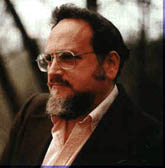
Arnold Rosner (b. 1945) is a prolific American composer whose music has been performed in the United States and Israel. His works exceed 100 in number and steer clear, generally, of both the post-serial avant-garde movement of the 1960’s and the minimalist movement which followed it. His treatment of harmony and counterpoint, along with the occasional recourse to an ethnic, Middle Eastern flavor, places his music in the esthetic milieu of Paul Hindemith, Ernest Bloch, and Alan Hovhaness.
Rosner is currently on the faculty of Kingsborough Community College of the City University of New York, where he teaches both standard and ethnic music. Having composed since the age of nine, he received advanced degrees from the State University of New York at Buffalo while studying with Leo Smit, Allen Sapp, Henri Pousseur and Lejaren Hiller, from all of whom, in his own words, “I learned practically nothing.”
|



